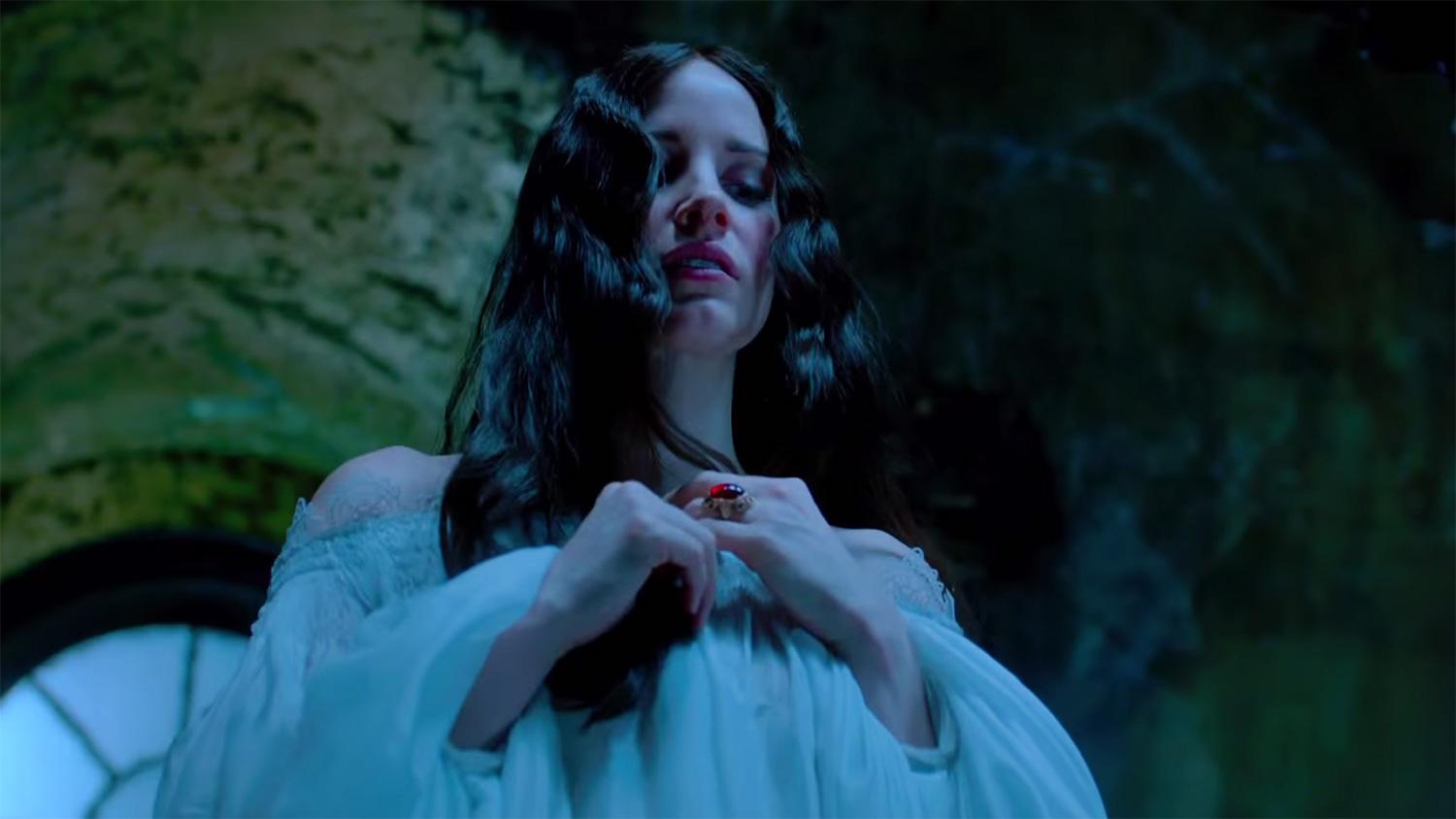“We all go a little mad sometimes.”
The casual way in which famous psycho Norman Bates explains himself is part of what makes him one of the most compelling villains in horror movie history. You can imagine that Norman’s sentiment is shared, if not precisely repeated, by Lucille Sharpe, the villain at the heart of Crimson Peak — assuming she’s the villain at all.
At the very least, Lucille is the antagonist of Guillermo del Toro’s haunted house horror movie, according to the filmmaker himself. When Digital Trends visited the set of the Universal/Legendary film last year, the Pacific Rim and Hellboy director remained tight-lipped about the story of the film, other than to say that it tells the tale of a young American woman, Edith Cushing (Mia Wasikowska), leaving the states with her new husband Thomas Sharpe (Tom Hiddleston) and moving into Allerdale Hall, the English manor he and his family have called home for generations.
Female serial killers do it for the kill,” says Chastain. “The only thing they get out of it is the feeling they get when they kill.
Allerdale houses many secrets, but perhaps none greater than Thomas’ sister Lucille, the raven-haired mystery woman played by Jessica Chastain. The Oscar-nominated actress is best known for her work playing strong-willed and heroic women, most notably CIA analyst Maya in Kathryn Bigelow’s Zero Dark Thirty. With that in mind, it’s a surprise to see her playing such a gaunt and haunted figure in Lucille — and not just a surprise to viewers, but to the people making the movie as well.
“When I sent the screenplay to Jessica, I didn’t send it with any part in mind, but everyone assumed she was going to read for Edith,” says del Toro. “And when she read the script and said she wanted to play Lucille, which is the antagonist, I thought, ‘Smart girl!’ It’s a surprise.”
Again, however, Chastain doesn’t think of Lucille as the antagonist, let alone the villain.
“I don’t see her that way, as I think any person who plays the baddie in a film would see it,” she says. “I see her as someone who has suffered a lot.”
It’s an interesting comment, considering Chastain’s surroundings. As she passionately defends Thomas Sharpe’s suffering sister, Chastain is inside of her trailer, surrounded by disturbing photographs and written passages featuring unspeakable horrors, pasted upon the walls. She even admits that she’s been reading up on female serial killers as part of her preparation for playing Lucille, and has learned that they “are more dangerous and scary than male serial killers because men do it to cover up things that they’ve done, like rape or anything like that, while female serial killers do it for the kill; the only thing they get out of it is the feeling they get when they kill.”
So, there’s that.
For his part, Hiddleston feels much more prepared to shine some light on the darkness of his on-screen sibling. He says of Thomas’ view of Lucille: “I think he feels very responsible for Lucille. He feels a need to look after her and protect her. She’s a very delicate and vulnerable woman, and given their family history, she needs a great deal of care and attention. On one level, he’s pulled home by Lucille, reminded of the past and the pain and the experiences they’ve had — but Edith is this light that’s pulling him away from her, that represents new experiences. She’s the future, the light in his life.”
Edith is the sun, and Lucille is the moon.
Chastain puts it another way: “Edith is the sun, and Lucille is the moon.” The sun isn’t exactly setting well with Lucille, though we won’t know exactly why or how that displeasure will manifest until Crimson Peak plays before our eyes. At the moment, however, we do know a little bit about Lucille’s traumatic past. It involves a baby, and while Chastain won’t say what happened to the infant, she’s teases that “it did not turn out well, for her or for the child.”
The child lingers heavily in Lucille’s heart, and lingers in the air, as well, in the form of a mournful melody that Lucille plays on the piano at certain points throughout Crimson Peak. Chastain learned how to play piano specifically for the movie, and she demonstrates her skills for us, methodically moving the keys of her keyboard with pain and purpose. There are few dry eyes inside of Chastain’s trailer when she’s finished performing.
“See, I love her,” an emotional Chastain tells us, sitting by the keyboard. “Even though she’s… she’s misguided.”
Like the three other key Crimson Peak players, Chastain knows secrets about Lucille that remain mysterious to her co-stars. Perhaps it’s that hidden knowledge that keeps her feeling so fiercely loyal to the admittedly misguided Lucille.
“I know Guillermo pretty well because we’ve worked together before [on Mama], but I’ve worked on a lot of dramas, and you never get anything like this from a director,” she says, referring to the biographies he penned for each character. “I’m used to having to do all this work on my own. When he sent me this, it was such a dream come true.”
Unlike the other actors, Chastain actually shares some of what’s written in her biography — a string of words that summarize Lucille’s life.
“Positives: loyal, determined, intelligent, meticulous, decisive, observant, eloquent, artistic, passionate, sensitive, delicate, protective, unwavering,'” she says, reading from the bio out loud. “‘Negatives: Insular, narcissistic, violent, domineering, possessive, agoraphobic, germaphobic, vengeful, jealous, manipulative, depressive, demanding, suffocating.”
Chastain even reveals Lucille’s secret dream: “To never leave Allerdale Hall.” It’s very possible she’ll get her wish by the time the book is closed on Crimson Peak, one way or another.
Make sure to check out part 1 and part 2 of our Crimson Peak set visit coverage.
Crimson Peak opens on October 16.







